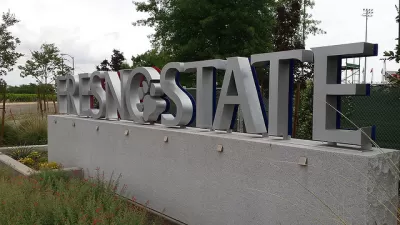A 'peer review' committee advises that the legislature should refuse to authorize funding for the first phase of California's high speed rail project, citing a "immense financial risk" for the state.
"The conclusion by the California High-Speed Rail Peer Review Group is a serious blow to the project as it is currently designed because state law specifically empowered the group to make recommendation before any serious money on the train could be spent."
Nonetheless, Governor Brown will ask the legislature to release $2.7 billion of the voter-approved $9.9 billion bonds in a 2008 ballot measure. {Planetizen: Gov Reafirms Faith In Controversial CA High Speed Rail Project}.
However, that bond "measure required that the Peer Review Group sign off on the feasibility and reasonableness of the plan to build the rail system before the state issues the bonds."
From Mercury News: Experts: Don't build $99 billion California bullet train: "Warning of an "immense financial risk" to the state, a renowned group of transportation and financial experts advised lawmakers (Jan. 3) to pull the emergency brake on funding California's $99 billion high-speed train. Former Caltrans chief Will Kempton, the group's chairman, said most troubling was the state's plan to spend all available funding -- $6 billion -- on a small stretch of track in the Central Valley and hope for the rest of the money later." {Peer Review Committee report located below on-line article. Also, see Planetizen: Is the Central Valley The Vietnam For CA High Speed Rail?}
The response from the CA High Speed Rail Authority? See their Press Release: "While some of the recommendations in the Peer Review Group report merit consideration, by and large this report is deeply flawed, in some areas misleading and its conclusions are unfounded."
Thanks to MTC-ABAG Library
FULL STORY: California high-speed rail funding could be in jeopardy

Alabama: Trump Terminates Settlements for Black Communities Harmed By Raw Sewage
Trump deemed the landmark civil rights agreement “illegal DEI and environmental justice policy.”

Study: Maui’s Plan to Convert Vacation Rentals to Long-Term Housing Could Cause Nearly $1 Billion Economic Loss
The plan would reduce visitor accommodation by 25% resulting in 1,900 jobs lost.

Why Should We Subsidize Public Transportation?
Many public transit agencies face financial stress due to rising costs, declining fare revenue, and declining subsidies. Transit advocates must provide a strong business case for increasing public transit funding.

Paris Bike Boom Leads to Steep Drop in Air Pollution
The French city’s air quality has improved dramatically in the past 20 years, coinciding with a growth in cycling.

Why Housing Costs More to Build in California Than in Texas
Hard costs like labor and materials combined with ‘soft’ costs such as permitting make building in the San Francisco Bay Area almost three times as costly as in Texas cities.

San Diego County Sees a Rise in Urban Coyotes
San Diego County experiences a rise in urban coyotes, as sightings become prevalent throughout its urban neighbourhoods and surrounding areas.
Urban Design for Planners 1: Software Tools
This six-course series explores essential urban design concepts using open source software and equips planners with the tools they need to participate fully in the urban design process.
Planning for Universal Design
Learn the tools for implementing Universal Design in planning regulations.
Smith Gee Studio
Alamo Area Metropolitan Planning Organization
City of Santa Clarita
Institute for Housing and Urban Development Studies (IHS)
City of Grandview
Harvard GSD Executive Education
Toledo-Lucas County Plan Commissions
Salt Lake City
NYU Wagner Graduate School of Public Service



























